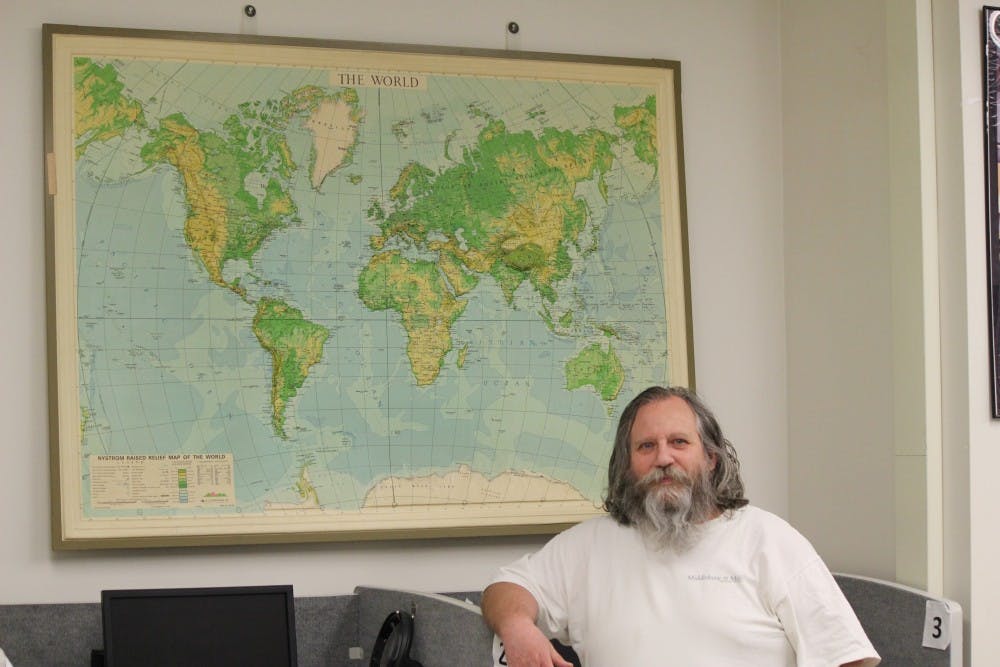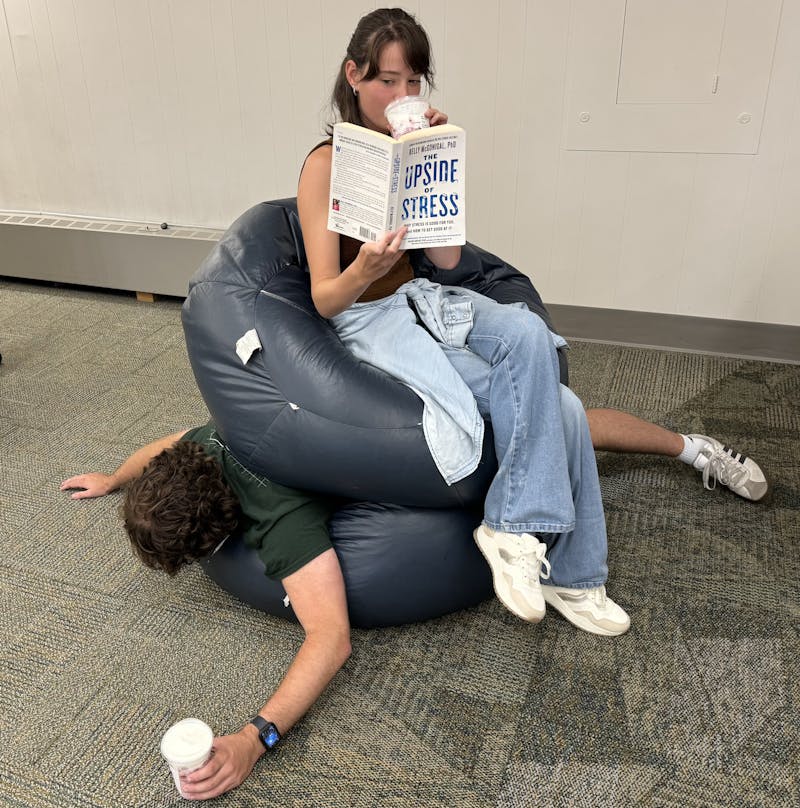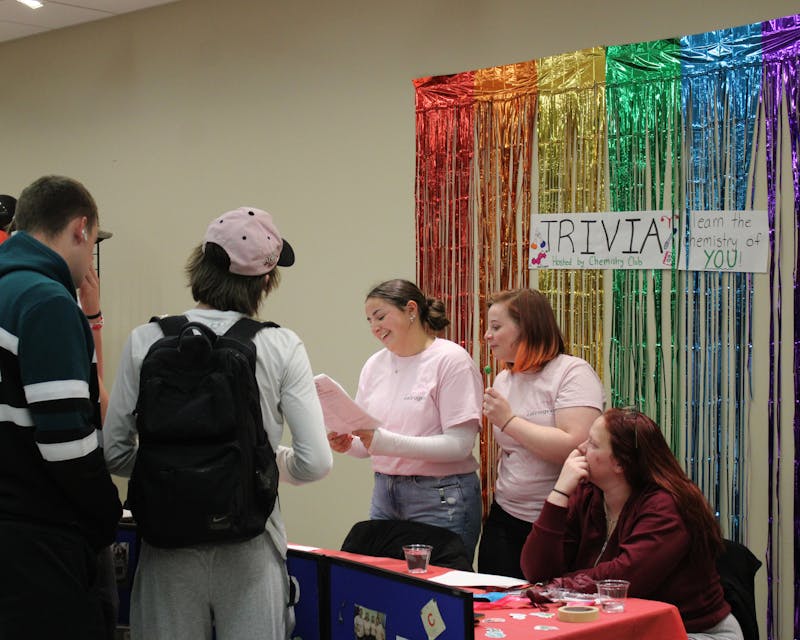One, اثنين , 三, 四, пять, viis, έξι, επτά, ocho, nove, dix, elf, 12, kumi na tatu, چودہ, quindecim; that is how “Reggie” counts from one to 15.
Reginald Hefner, also known as Reggie, is currently a student at Shippensburg University. SU students taking foreign language courses know Hefner because he speaks 13 languages, and knows two additional written languages. If students need help with their foreign language classes, they usually go to Reggie.
Hefner speaks Arabic, Chinese, Japanese, Spanish, French, Portuguese, Italian, Modern Greek, Russian, Hindi, Urdu, German and Swahili. Hefner can also read Latin and Sanskrit at a high level.
Since 2014, Hefner has worked at the Modern Language Laboratory, located in Rowland Hall, as a computer laboratory assistant. He is also the driver for the Modern Language Department when the language clubs and classes take field trips. However, Hefner is best known for his ability to assist students when they need help with their foreign language courses.
During his early childhood, Hefner got into a sledding accident and hit his head on the side of a brick wall. Hefner was in a coma and was not expected to come out of it. But after six months, Hefner woke up.
“They expected me to die. I didn’t die, I survived that,” Hefner said.
Anyone that he spoke to thought that he was not mentally advanced because of the way his speech was slurred. They expected Hefner to be mentally challenged when he came out of the coma and they believed he would need to take special education classes because of the speech impediment he developed after the accident.
“Special education at that time was not like it is today. Basically, the kids in special ed. were put in a basement beside the boiler room and people would hope that they quit school before sixth grade so that no one would have to see them ever again,” Hefner said.
Hefner did not want the life that mentally challenged kids had to endure during that time in the public school system. As a kid, he thought that if he were to read all of the books in the local library, that it would make him smart and he would not be put in special education classes.
Hefner did not know which book to read first, and he knew that the books in the children’s section would not have the educational value he needed to complete his strategy. So Hefner had to sneak into what was previously called the “adult section,” which contained textbooks too advanced for children.
Hefner pulled out a random book, which was “Introduction to Ancient Greek” by John White. Hefner was not permitted to check out the book because it was from the adult section, but he hid the book behind other books in the kids’ section.
“And whenever I wanted to use it, I would pull it out. I’d go to a table and I would make a big fort of other books around me, so no one could see what I was doing. And I would open up the page I wanted to work on, and I had a brown composition notebook where I’d copy out by hand, the lessons word for word. So I could take my notebook home, since I didn’t have to check that out,” Hefner said.
To this day, he still has a callus on his middle finger that he got from copying down lessons from books he read as a kid.
As Hefner was going through his strategy, learning foreign languages, he still had the issue of not being able to speak English properly. Hefner would check out a series of records for English speech. He would then record his voice and play it back to himself so that he could hear what he needed to improve.
“The librarian questioned why I wanted this [series of English speech records], but when she heard me try to talk, she kind of understood,” Hefner chuckled, “She said something like, ‘more power to ya,’ or something.”
Hefner continued teaching himself different languages this way and was able to get away with sneaking the books because people were not generally interested in foreign language at the time. Hefner continued with his strategy in high school as he took four years of Spanish, German, French and Latin courses to gain more experience with foreign languages.
During the Vietnam War, Hefner enlisted in the Army and was sent to Chinese language training at the Defense Language Institute. Then Hefner served as a Chinese interpreter, translator and interrogator for four years, six months and 24 days. After that period, Hefner was homeless for four months, living in a state park and selling his blood plasma to get $5 a week so that he could eat at the all-you-can-eat buffet. Hefner then ended up at the University of Maryland as a Russian language and literature major, and one year later, finished a bachelor’s degree in Russian.
The Cold War was during this time and Hefner heard that the United States government was in need of a Russian linguist to deal with the Soviet Union. Hefner thought that it would be a perfect opportunity to get a job. Hefner applied to the U.S. government to be a Russian linguist, passed all of the tests and then was told that they did not need more Russian linguists at the time.
However, they told Hefner that if he knew Chinese then they might have been able to use him. So Hefner contacted the human resources department and informed them that he did know Chinese and would be able to work as early as possible, but they were not able to hire him quickly.
Hefner joined the Army Reserves as a Russian and German specialist and was sent to Fort Bragg in North Carolina as a member of Special Forces, Special Operations Group. Hefner was there from June to August.
As part of his Army Reserve duties, Hefner taught Japanese, Chinese, Spanish and Portuguese. Then the National Security Agency contacted Hefner with an employment opportunity.
Hefner has 26 years of experience working for the government as a professional linguist.




The Slate welcomes thoughtful discussion on all of our stories, but please keep comments civil and on-topic. Read our full guidelines here.